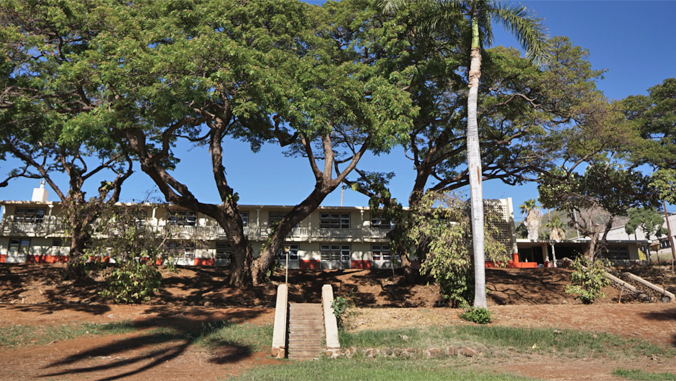
The University of Hawaiʻi at Mānoa’s Center for Oral History in the Department of Ethnic Studies has released a new collection documenting the lives of Native Hawaiian Lahainaluna High School alumni who were boarding students between the 1950s and 1990s. The project highlights the stories of 20 former boarders, capturing their experiences in a series of interviews now available online.
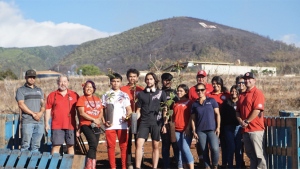
Conducted from 2022 to 2024, the project was led by Professor Ty Kāwika Tengan and graduate research assistant Wailana Medeiros, with support from Center for Oral History Associate Director Micah Mizukami, former Director and Professor Emerita Davianna Pōmaikaʻi McGregor, and other Center for Oral History staff.
“The important source of continuity are the stories of the elders of the land and these communities,” Tengan said. “In order for us to better understand our way forward, we need to know the moʻolelo (stories), the histories and through the spoken form—those that haven’t been recorded. It’s really important to be able to sit down with kūpuna who want to share and pass on these stories to maintain intergenerational connections, especially in a place such as Lahainaluna that has such a steeped history.”
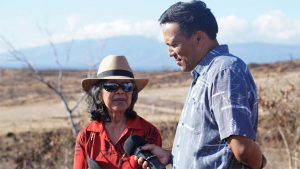
Lahainaluna, founded in 1831 at the foot of Puʻu Paʻūpaʻū, is Hawaiʻi’s only public boarding high school and is recognized as the oldest high school west of the Mississippi River. The boarding program began in 1836 and has played a pivotal role in the school’s legacy, offering agricultural work experiences and a sense of community for students from across the islands.
The collection includes full interview transcripts uploaded to UH’s ScholarSpace, along with a digital StoryMap curated by Medeiros, to showcase the lives, contributions and reflections of the narrators.
“We got to really step into the boarder lifestyle and get a glimpse of what each generation experienced as boarders at Lahainaluna,” Medeiros said. “Since this was my first ever oral history project, it really emphasized how important oral histories are to Hawaiʻi, and how when we conduct oral histories, they aren’t just extracting information but they’re meant to tell an entire life story.”
Voices of former boarders
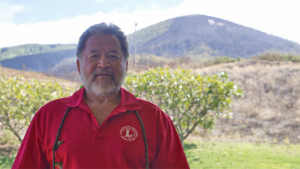
The project sheds light on the cultural and historical significance of Lahainaluna’s boarding program and its impact on generations of Native Hawaiian students. Craig Murakami was a former boarding student who participated in this project. He was born and raised in Kahului, and descends from the Marciel family of East Maui. He graduated in 1971, serves as president of the Lahainaluna Boarders Association and still lives on Maui.
“My only regret is that it took me over 50 years to realize that all the success in my career and my life was all related to lessons learned and experiences I had as a Boarder,” Murakami said. “Hopefully, these interviews will inspire other Boarders to speak about their experiences and encourage more students to participate in the program.”
Eddie Espiritu was born in Honolulu and raised on Molokaʻi. He attended Lahainaluna as a boarder and graduated in 1971. Espiritu still lives on Maui and serves as the secretary of the Lahainaluna Boarders Association.
“Though we may come from different eras and times we share the same values that we learned as Boarders,” Espiritu said. “The value of hard work, integrity, honor, pride and commitment are just a few. But through these shared experiences we find common ground that we can pass on to the current Boarders as well as those that will come in the future.”
Honoring memories, inspiring hope after fires
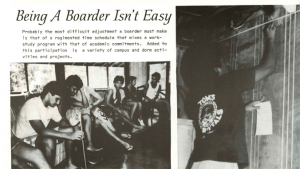
The project was briefly paused in 2023 following the devastating Lahaina wildfires, as the team and community focused on recovery and reflection. Tengan hopes this work can be a source of healing for the community.
“Despite all the changes, hearing these familiar stories, hearing names of people that they hadn’t seen—perhaps are gone now—and the memories of the place that was there before the fires inspires hope for that future, reconnection and knowledge that again Lahaina can come back,” Tengan said.
Virtual launch to share stories
To celebrate the project’s release, the Center for Oral History will host a virtual public launch on April 17, from 5 to 6:30 p.m. via Zoom. The event will highlight the project’s findings and feature insights into the boarding experience at Lahainaluna.
The project was made possible through the generosity of the HK West Maui Community Fund, and in collaboration with the Lahainaluna Boarders Association and Lahainaluna Library and Archives.
The Department of Ethnic Studies is housed in UH Mānoa’s College of Social Sciences.

